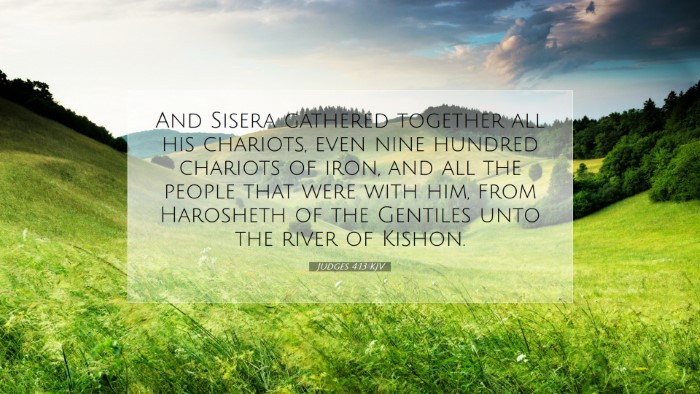Old Testament
Genesis Exodus Leviticus Numbers Deuteronomy Joshua Judges Ruth 1 Samuel 2 Samuel 1 Kings 2 Kings 1 Chronicles 2 Chronicles Ezra Nehemiah Esther Job Psalms Proverbs Ecclesiastes Song of Solomon Isaiah Jeremiah Lamentations Ezekiel Daniel Hosea Joel Amos Obadiah Jonah Micah Nahum Habakkuk Zephaniah Haggai Zechariah MalachiJudges 4:13
Judges 4:13 KJV
And Sisera gathered together all his chariots, even nine hundred chariots of iron, and all the people that were with him, from Harosheth of the Gentiles unto the river of Kishon.
Judges 4:13 Bible Commentary
Bible Commentary on Judges 4:13
Judges 4:13 states:
"And she sent and called Barak the son of Abinoam out of Kedeshnaphtali, and said unto him, Hath not the Lord God of Israel commanded, saying, Go and draw toward mount Tabor, and take with thee ten thousand men of the children of Naphtali and of the children of Zebulun?"
Contextual Overview
To fully appreciate the verse, one must acknowledge the historical and cultural context in which it occurs. This episode in the Book of Judges highlights the cyclical pattern of Israel's disobedience, oppression, repentance, and deliverance. The Israelites had been subjugated by Jabin, the king of Canaan, and were in desperate need of a deliverer.
The Leadership of Deborah
Deborah, a prophetess and judge, emerges as a pivotal figure in this narrative. Her role signifies not just a break from tradition but also a reflection of God's willingness to use anyone who is willing to follow His commission regardless of societal norms. As noted by Matthew Henry, Deborah’s leadership illustrates the importance of godly authority in times of crisis.
God's Command and Human Response
The call of Barak is crucial, as it highlights the divine command that comes through Deborah. Albert Barnes emphasizes that Deborah, through prophetic insight, communicates God’s directive to Barak.
- Divine Initiative: The verse shows that it is the Lord who commands action. Deborah asks Barak if he has heard this command, requiring his acknowledgment of God's authority.
- Human Agency: Barak’s response is paramount. His willingness or reluctance to act establishes the tension of faith versus fear that permeates this narrative.
The Significance of Mount Tabor
Mount Tabor is highlighted as the strategic location from which to launch the military campaign. Adam Clarke notes the geographical significance, describing Tabor as a prominent hill which offers a natural advantage in battle. Its selection signifies God's active involvement in the planning of the deliverance of Israel.
The Gathering of Troops
The directive to assemble troops from the tribes of Naphtali and Zebulun underscores a communal aspect of warfare in ancient Israel. Commentary from Matthew Henry elaborates on how the unity among tribes is crucial for victory, reflecting the importance of collective faith and action.
- God's Faithfulness: The gathering of the ten thousand men reflects God's faithfulness to provide the necessary resources and support for His mission.
- Preparation for Battle: This mobilization aligns with the biblical principle that while salvation is ultimately from the Lord, human effort is still essential.
Application for Today
The themes found in Judges 4:13 remain relevant for contemporary believers:
- Listening for God's Voice: Like Barak, believers are encouraged to attune themselves to Divine commands amidst distractions.
- Acting on God's Command: The call to action is a profound reminder of the necessity to respond affirmatively when God directs. Faith must be paired with obedience.
- The Power of Leadership: Strong leadership, as exemplified by Deborah, serves as an essential aspect of navigating through societal chaos for believers today.
- Unity in Mission: Just as Barak gathered men from his tribe, Christians are called to unite in purpose for the advance of God's kingdom.
Conclusion
This verse serves as a microcosm of the entire book of Judges—a narrative laden with themes of leadership, divine command, and the need for faithful action. The combination of Deborah's courageous call and Barak's response paints a powerful picture of what it means to step out in faith under God's guidance. For pastors, students, theologians, and Bible scholars, the insights from Judges 4:13 invite reflection on how we, too, can engage our communities and respond to God's directives with courage and faith.


